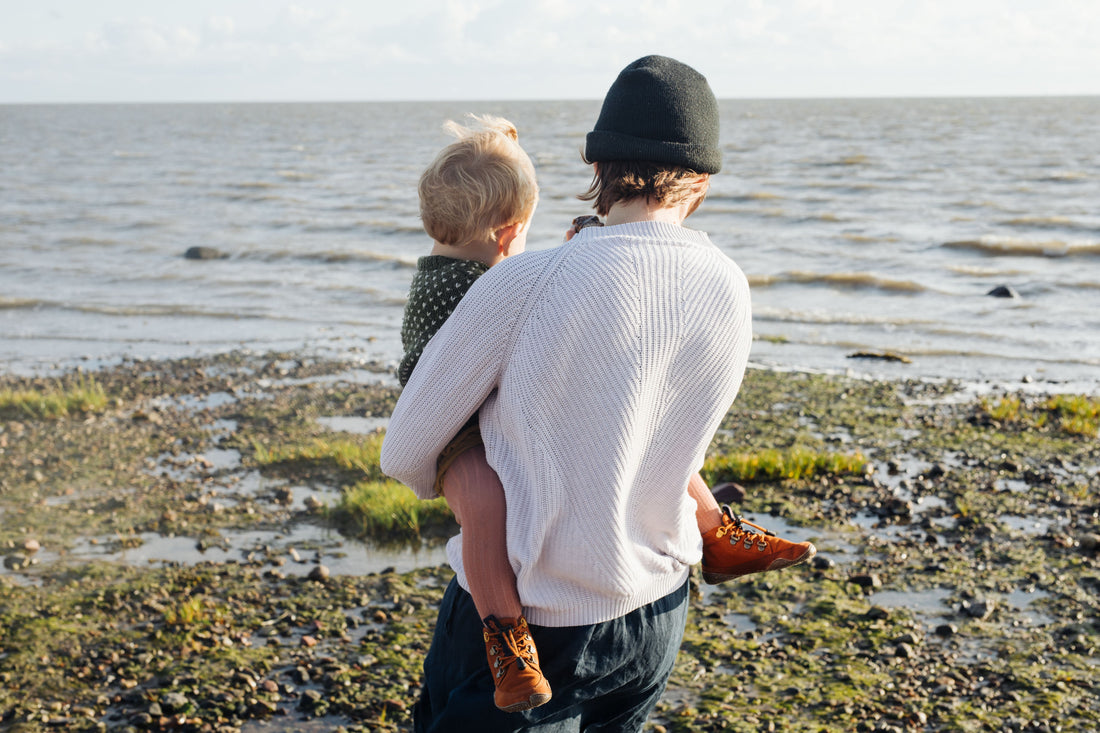A guest article by Jana Braumüller, former co-founder of Fashion Changers
In November 2023, there's one day in particular that we simply cannot avoid: Black Friday. It is one of the most important consumer days of the year. One which has traditionally been viewed quite critically, especially by eco-friendly companies. But times are changing. We have experienced a lot in recent years: pandemics, wars, inflation - crises. Much of this has had a very direct impact on our purchasing behavior - and therefore also on more sustainable companies.
According to the market research company GfK, their sustainability index is currently at an all-time low. "The current situation shows that sustainable consumption is increasingly becoming a question of income," says Petra Süptitz, sustainability expert at GfK. Almost half of those surveyed simply can no longer afford sustainability. So I asked myself this year: how should the sustainable fashion industry deal with phenomena such as Black Friday in light of the ongoing difficult economic situation? Continue to boycott, find loopholes or simply join in?
Black Friday -
as if we needed another day like that this year. There have been and still are plenty of Black Days. Black Friday is also famous for enticing people with offers that are, shall we say, rather ambitious for various reasons: For example, because companies produce extra products as cheaply as possible in order to sell them cheaply (albeit with a large margin) on Black Friday. Or because such a sale tempts us to buy things that we don't actually need. Or because even more is produced in the end, most of which ends up in the garbage. So there is plenty of criticism - and rightly so.
But are there any valid reasons to join in?
Because let's be honest: we can't really escape it - neither as a company nor as customers. If I look around in my immediate environment, at acquaintances, friends, but also in my neighborhood and outside my peer group, the question of affordability is currently at the top of the list.
Wouldn't it be nice if more people could afford fairly manufactured products? Especially in the knowledge that these products are created in a value chain where everyone involved is paid and treated fairly and the environment is not harmed. Especially in times like these, when sustainability issues are increasingly being overlooked and yet are more pressing than ever. If eco-friendly companies sold more products thanks to lower prices, this would be a win-win situation for everyone: producers, brands, and consumers.
And there's another argument: Appeal.
According to GfK, 73% of consumers still believe that they actively contribute to climate protection through their own behavior. These 73 percent need an offer that is affordable and appealing. Of course, eco-friendly products often cannot compete with fast fashion in terms of price. Nor should they. But some people in this large majority are certainly prepared to spend a little more - but not much more - for a genuine sustainability promise. On days like Black Friday, they are on the lookout for precisely this offer. Where will they buy if there is no sustainable alternative available?
I am not alone here. There are rumblings in the Fair Fashion industry. Lots of people are having second thoughts. Some are offering alternatives, such as discounts throughout the month - with a different framing, of course, because, yes, it sounds more attractive. Others only offer a discount that they can implement on Black Friday. Still others couldn't be bothered because they gave up long ago.
And Wildling?
They're taking part for the first time this year. Surprising - even for me. And yet: understandable. I wanted to find out from Anna Yona, co-founder of Wildling Shoes, what motivated her to take part.

Anna Yona, Wildling Shoes' founder. Image: Sandra Chiolo | Wildling Shoes
We also talk about what sales mean in the industry in general and why a different, forward-looking narrative is good for us in these times in order to continue as a company.
Jana Braumüller: Until now, Wildling has been very critical of Black Friday. This year you're taking part for the first time - why?
Anna Yona: Our criticism of Black Friday and similar formats so far has been that these events encourage people to buy things they don't actually need. Companies rely heavily on this impulse buying. This is also a symptom of our throwaway society: cheaply produced items that don't last long and the respective mountains of waste - particularly in the fashion sector. Many companies plan a sale from the outset and then in some cases deliberately overproduce for the sale.
At Wildling, we have always used sales very clearly to compensate for planning errors. On the other hand, we also know that our products are relatively expensive due to our ecological and social production standards and that people are happy to get our products for a slightly lower price.
So do you feel pressure from the industry?
Anna: The last few years have been difficult for the entire industry - first due to the pandemic, then the recession, the rise in the cost of living, and inflation. There were planning errors throughout the market. Most brands planned for a different year altogether. This is now creating something that is prompting many brands to get rid of their stock through sales and discounts. Either individual codes are used to offer discounts throughout the year or certain models are permanently offered at lower prices. And now even more so on Black Friday. Of course, this also puts us under a fair amount of pressure after a while: If we're not there, a lot of work ends up being for nothing.
What do you mean by that?
Anna: We are constantly trying to appeal to customers, creating high-quality content and we are not visible at the moment when people are shopping. In a year like this, people get serious discount offers all the time. Now, through personalized advertising, this is also happening in a very targeted way. Someone who has been on our site will subsequently receive advertising from our competitors.
If they can lure you in with low prices, all the work we have put into building our brand is lost. In other words, we have to find a way to remain competitive. We can't continue to say that we're not doing it on principle because we're losing customers to our competitors. That's why we're taking part this year and we also hope that we'll reach people who might wear the products for the first time.
We are not ditching our values for this. On the contrary: we are doing it in a way that suits our ideals. On the other hand, we also hope that we can provide the community a deal. Especially for those who have been loyal customers for a super long time but can no longer afford the shoes this year. We know that this need exists. And we would like to fulfill it.
A massive sale like Black Friday reflects the whole dilemma of the fashion industry: far too much is produced that has to be sold off at the end. In the more sustainable sector, brands try to calculate in such a way that this doesn't happen, but there are still planning errors. So does a sell-off prevent goods from being thrown away and resources being used in vain? What would happen otherwise?
Anna: That is precisely the underlying question: What would happen to the clothes otherwise? At Wildling, we don't follow any major fashion trends in our collections. The shoes are of course current, but they stay that way. If we have something left over at the end of the season, it remains in the collection. We have never destroyed or thrown away good goods in any form. Then it might take two years until the last items are gone, and not one year as planned.
We also have many styles that belong to the essentials collection. Then there is no waste anyway. Nevertheless, a certain amount of pressure can arise when our warehouse completely fills up. It then becomes very complex logistically. That's why it makes sense at some point to say that a certain model might be permanently reduced in order to create space.
So, in other words, a sale is a tool for managing the flow of goods?
Anna: Yes, but brands have to be careful not to plan merchandise for a sale next year. That's more the point. And there's the other side of the coin: we don't want to tempt or pressure people into buying things they don't need. That wouldn't be sustainable.
There is a great responsibility in this, which we are also aware of in our communication. For example, we don't offer individual discount codes or extremely limited offers such as "25% off, but only this weekend" and send out three emails so that you end up thinking: I really need this shoe now.
But then why Black Friday at all? You could have chosen a time outside of this huge consumer event. At the end of the day, you're swimming in the same waters of mass consumption.
Anna: Of course, we also considered whether there was a more suitable timeframe for us. But again, the problem is that we are part of a market. On and around Black Friday, we have double or triple the traffic in our online store. People are looking for offers. There are also people who need a certain product. To save money, they wait for a day like Black Friday. When these people come to our site, we wouldn't be able to meet their needs without a sale.

Atmo Paprika. Image: @sarahboll.de & @annadammpunktcom
Yet you just raised your prices at the beginning of the year. Couldn't you generally offer the entire product line at a lower price?
Anna: We had to raise prices because our costs have risen so much - especially in the last year or two. Otherwise it would no longer have worked for us as a company. We buy very high-quality, and therefore also high-priced materials and have a product that is quite expensive to manufacture, simply because there is a price to fair and environmentally friendly production. But of course, at the same time, we ask ourselves: where can we cut additional costs? As soon as we manage to do this, there will be cheaper shoes again. But that takes time.
There are also shoes that we cannot offer at a lower price because that is simply what the shoes are worth and we stand by that. And we are of course trying to respond to the community's desire for more affordable models. The aim is to have a certain range so that people can choose for themselves what suits their situation and how much they would like to spend.
Back to the product itself, to be more specific: Nothing has changed in the supply chain for the shoes that go over your counter on Black Friday? All producers get the same rates?
Anna: Exactly, these are our regular products. We didn't have Wildlings produced especially for the sale. There are companies that plan big sales like Black Friday from the outset. We don't do that.
What else sets you apart from other companies when it comes to sales?
Anna: There are brands that build their business model on sales events like this. What I find really important, and that was also the thing I struggled with the most, is to see the environment in which we operate. We can't completely free ourselves from it. We simply can no longer afford to ignore the rules of the game - or rather: to want to change them.
We would like to continue doing our marketing differently, for example. Our strongest tool is still the personal recommendation of the community. But the fact is that we cannot rely on this alone. We simply can't keep up otherwise.
If we deny ourselves everything, we also lose the opportunity to initiate and finance great projects, build great partnerships or create a great team culture. This is also not easy in times of crisis. And if we have to adapt to the market environment and the associated strategies to a certain extent so that we can continue to finance such partnerships and find solutions for the entire industry, then so be it.
If you could have one wish: How would you like the fashion industry to deal with sales in general?
Anna: Of course, it would be ideal if all companies were politically committed to "true prices", which would also reflect ecological and social costs to ensure fair prices. If the value of the product, the value of the relationship that somehow shapes this product, made up part of the price. Then I don't think we would have to argue about sales in the fashion industry. Then it would be clear that a T-shirt can't cost five euros. If all companies factored in the actual social and ecological costs, then we would have a system in which we could operate wonderfully - even now.
But the way it is at the moment, what is often produced at the highest social cost is the cheapest on the market. The industry also makes people believe that you're not cool enough, that you don't belong if you don't have this or that. What are people supposed to do apart from somehow try to fit in? Overall, we simply have the wrong conditions to operate in.
If we invest in Wildling at the moment, we won't necessarily benefit from it afterwards. This in turn results in higher prices and is, of course, a major problem right now. Many products on the market are currently far too cheap and yet a sale is already factored into the price so that the margin ends up being right for the person selling it.
This is another pressure that arises in a market that is totally unhealthy. No one who works in this industry can escape it, because ultimately the constraints and pressures from the rest of the world apply to us and our customers too. That's why it would be nice if all companies we had to set a fair price from the outset. At Wildling, we do exactly that and will continue to do so.
Thank you so much, Anna, for your frank conversation. I'll be honest: I'm looking forward to Black Fox Friday. My kid urgently needs new shoes.

Jana Braumüller works as a freelance journalist and copywriter, particularly on the topics of sustainability, fashion and social policy. In 2018, together with Vreni Jäckle and Nina Lorenzen, she founded Fashion Changers - an educational platform for fair and sustainable fashion. Jana Braumüller left Fashion Changers as co-founder at the beginning of 2023.
Image: Emilie Elizabeth
Cover image: @sarahboll.de & @annadammpunktcom


